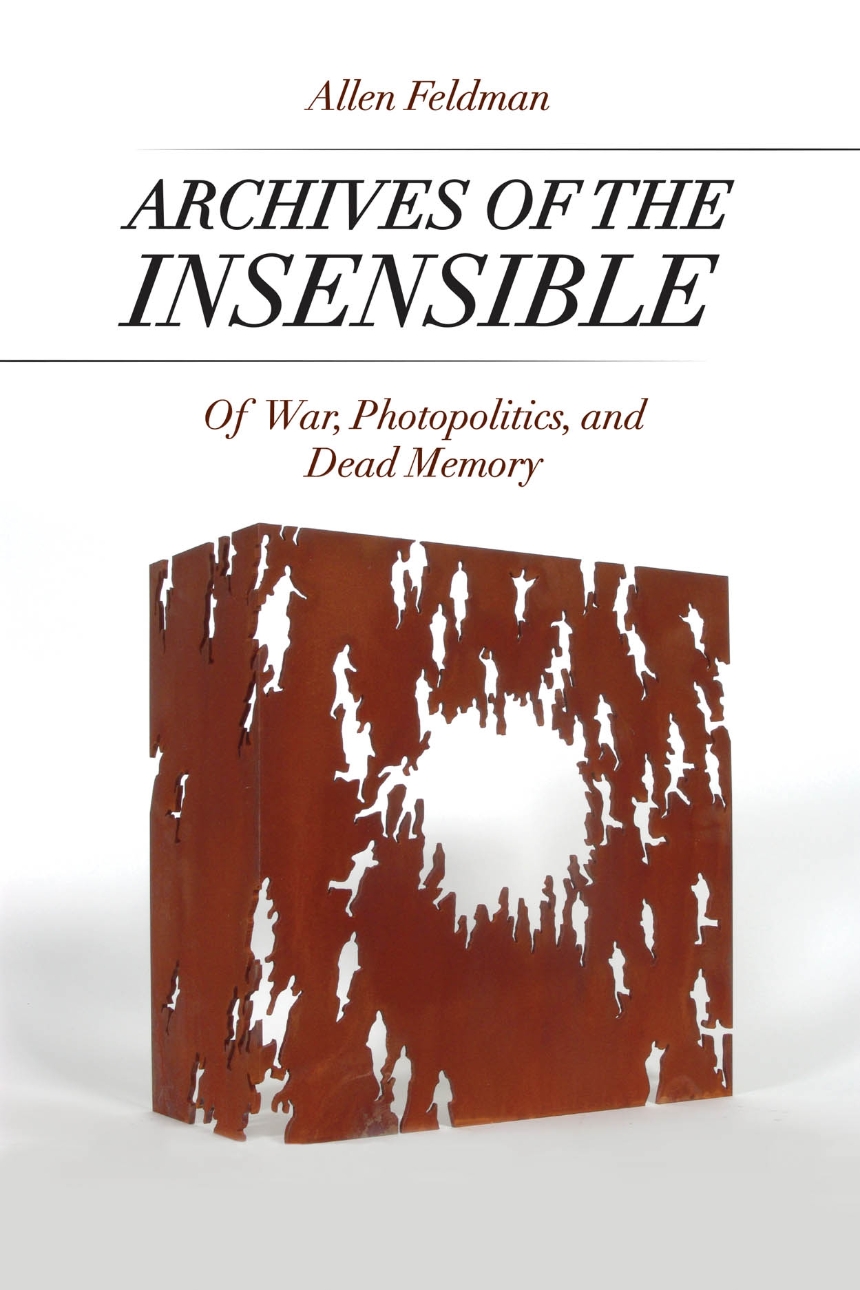Archives of the Insensible
Of War, Photopolitics, and Dead Memory
9780226277332
9780226277165
9780226277479
Archives of the Insensible
Of War, Photopolitics, and Dead Memory
In this jarring look at contemporary warfare and political visuality, renowned anthropologist of violence Allen Feldman provocatively argues that contemporary sovereign power mobilizes asymmetric, clandestine, and ultimately unending war as a will to truth. Whether responding to the fantasy of weapons of mass destruction or an existential threat to civilization, Western political sovereignty seeks to align justice, humanitarian right, and democracy with technocratic violence and visual dominance. Connecting Guantánamo tribunals to the South African Truth and Reconciliation Commission, American counterfeit killings in Afghanistan to the Baader-Meinhof paintings of Gerhard Richter, and the video erasure of Rodney King to lynching photography and political animality, among other scenes of terror, Feldman contests sovereignty’s claims to transcendental right —whether humanitarian, neoliberal, or democratic—by showing how dogmatic truth is crafted and terror indemnified by the prosecutorial media and materiality of war.
Excavating a scenography of trials—formal or covert, orchestrated or improvised, criminalizing or criminal—Feldman shows how the will to truth disappears into the very violence it interrogates. He maps the sensory inscriptions and erasures of war, highlighting war as a media that severs factuality from actuality to render violence just. He proposes that war promotes an anesthesiology that interdicts the witness of a sensory and affective commons that has the capacity to speak truth to war. Feldman uses layered deconstructive description to decelerate the ballistical tempo of war to salvage the embodied actualities and material histories that war reduces to the ashes of collateral damage, the automatism of drones, and the opacities of black sites. The result is a penetrating work that marries critical visual theory, political philosophy, anthropology, and media archeology into a trenchant dissection of emerging forms of sovereignty and state power that war now makes possible.
Excavating a scenography of trials—formal or covert, orchestrated or improvised, criminalizing or criminal—Feldman shows how the will to truth disappears into the very violence it interrogates. He maps the sensory inscriptions and erasures of war, highlighting war as a media that severs factuality from actuality to render violence just. He proposes that war promotes an anesthesiology that interdicts the witness of a sensory and affective commons that has the capacity to speak truth to war. Feldman uses layered deconstructive description to decelerate the ballistical tempo of war to salvage the embodied actualities and material histories that war reduces to the ashes of collateral damage, the automatism of drones, and the opacities of black sites. The result is a penetrating work that marries critical visual theory, political philosophy, anthropology, and media archeology into a trenchant dissection of emerging forms of sovereignty and state power that war now makes possible.
432 pages | 31 halftones | 6 x 9 | © 2015
Anthropology: Cultural and Social Anthropology
Political Science: Political and Social Theory
Reviews
Table of Contents
Acknowledgments
Introduction: Enigmatic Dispersals
PART I: DESISTING SOVEREIGNTIES
ONE / Before the Law at Guantánamo
TWO / The Apophatic Blur of War
THREE / First- Person Shooters: The Critique of Monopoly Violence
PART II: AMPUTATING ARCHIVES
FOUR / The Structuring Enemy and Archival War
FIVE / Traumatizing the Truth Commission
PART III: COMMITTING ANTHROPOLOGY
SIX / Turning Around Scars
SEVEN / Expiring Animality
Index
Introduction: Enigmatic Dispersals
PART I: DESISTING SOVEREIGNTIES
ONE / Before the Law at Guantánamo
TWO / The Apophatic Blur of War
THREE / First- Person Shooters: The Critique of Monopoly Violence
PART II: AMPUTATING ARCHIVES
FOUR / The Structuring Enemy and Archival War
FIVE / Traumatizing the Truth Commission
PART III: COMMITTING ANTHROPOLOGY
SIX / Turning Around Scars
SEVEN / Expiring Animality
Index
